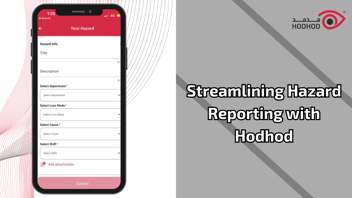Unveiling the Impact of Delayed Safety Incident Reporting
This article delves into the uncharted territory of the financial ramifications of delayed incident reporting and presents Hodhod platform as a beacon of hope in addressing this critical issue.
In today's rapidly evolving business landscape, where every decision has a financial implication, one crucial aspect often overlooked is the timely reporting of safety incidents. Whether it's a workplace accident, data breach, or any other unexpected event, delayed incident reporting can have far-reaching consequences that extend well beyond the immediate aftermath. This article delves into the uncharted territory of the financial ramifications of delayed incident reporting and presents Hodhod platform as a beacon of hope in addressing this critical issue.
The Hidden Costs of Delayed Incident Reporting
The repercussions of delayed incident reporting are like ripples in a pond - starting small but gradually expanding to impact various areas of an organization. The immediate costs might seem negligible, but the long-term financial toll can be substantial.
Legal and Regulatory Penalties: Many incidents trigger legal and regulatory requirements that demand swift reporting. Failure to meet these obligations can result in hefty fines and legal battles that drain company resources.
Operational Disruption: Postponed incident reporting can lead to extended downtime, supply chain disruptions, and reduced productivity. This translates to missed opportunities, dissatisfied customers, and increased operational costs.
Reputation Damage: Delayed incident reporting can tarnish a company's reputation, eroding customer trust and loyalty. Rebuilding a damaged image is not only time-consuming but also expensive.
Escalating Remediation Costs: Addressing incidents early can help contain damages, reducing the costs associated with incident containment and recovery. A delay can lead to the escalation of these costs, impacting the bottom line.
Insurance Premiums: Insurance claims often require prompt incident reporting. Delays might result in insurers raising premiums, adding another financial burden to the organization.
The Hodhod Platform presents an array of robust features designed to bolster financial stability and operational prowess. By offering real-time incident reporting capabilities, Hodhod bridges the gap between incident occurrence and reporting, enabling organizations to swiftly address issues and yield substantial cost savings. Its intuitive interface simplifies the reporting process, ensuring prompt dissemination of critical information.
In conclusion, the financial implications of delayed incident reporting are undeniable. Organizations must recognize that every moment counts and that the costs of procrastination extend beyond immediate inconvenience. The Hodhod platform emerges as a beacon of hope, providing a seamless and efficient solution to the perennial problem of delayed incident reporting. By adopting Hodhod, organizations can navigate the complex financial landscape with confidence, safeguarding their resources and securing a stable financial future.


